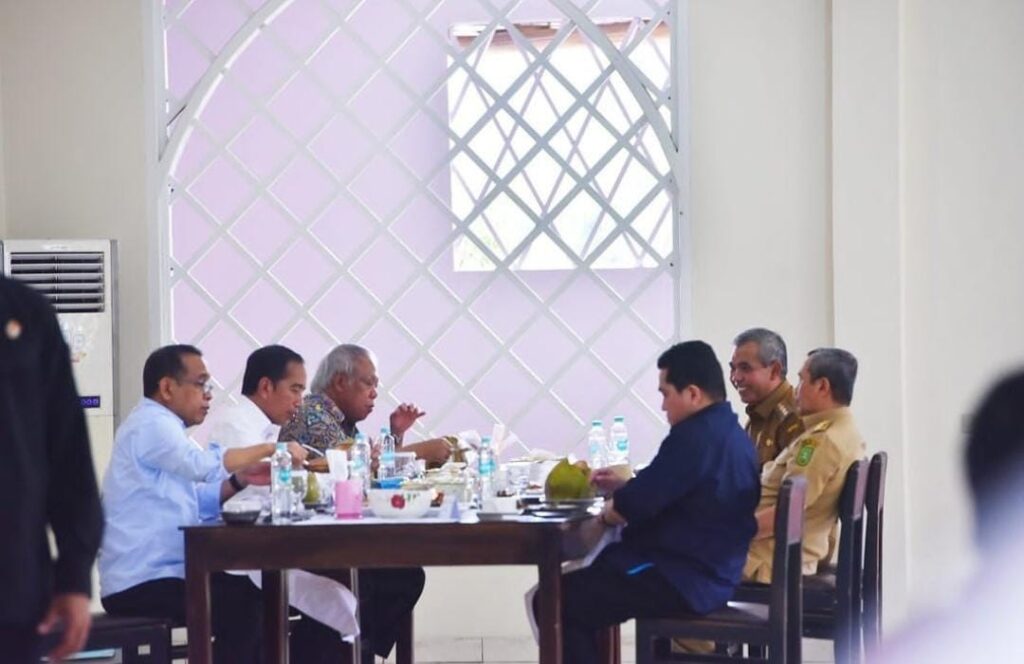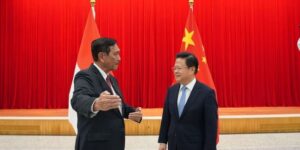
STRATEGIC ASSESSMENT. On July 10–14, CNBC Indonesia presents the 2023 Economic Update with the theme “Building Optimism for Stronger Recovery” to explore prospects, challenges, and the private sector’s contribution to encourage optimism for Indonesia’s economic development amid global uncertainty. In response to questions about Chinese investors in Indonesia’s mineral downstream project, Maritime Affairs and Investment Coordinating Minister Luhut Binsar Pandjaitan said on Monday that the government is open to investment from any country, but China’s high technology is the main consideration. Meanwhile, Luhut said that Chinese foreign workers in the downstream project were only at the beginning phase as part of the technology transfer strategy. However, the local labor force has grown significantly in recent years.
Maritime Affairs and Investment Coordinating Minister Luhut Binsar Pandjaitan said that downstream development is one of Indonesia’s strategies to become a developed country. Luhut said young generation plays important role to boost the downstream economy.
Indonesia will soon have a giant copper processing and refining plant that will be the world’s biggest single line smelter. This facility run by PT Freeport Indonesia is slated to begin operating in May 2024. In addition to production of 600,000 tons of copper cathode, the smelter located in the Java Integrated Industrial & Port Estate (JIIPE) special economic zone (KEK) in Gresik, East Java will also be producing 50 tons of gold per year.

This was disclosed by Coordinating Minister of Maritime Affairs and Investment (Menko Marves) Luhut Binsar Pandjaitan during the Economic Update 2023 by CNBC Indonesia. “This smelter that we are building in Gresik will be able to extract 50 tons of gold per year, I repeat, 50 tons of gold per year,” Luhut revealed at the CNBC Indonesia Economic Update 2023. Luhut underscored the importance and magnitude of value addition from industrial downstream activity for the nation. He said if such downstream activity had been initiated decades ago or at the time Freeport began mining in Indonesia, the added value the state could have gained would have been able to pay for infrastructure development across the nation.
It’s not just about putting Indonesia on the global stage; the G20 Summit in Bali in November 2022 left “souvenirs” in the form of international funding commitments to support the energy transition. To finance this transition, Indonesia will require massive funds. Unfortunately, the grant portion remains relatively small and uncertain. The Just Energy Transition Partnership (JETP), worth approximately IDR310 trillion, is one of the agreed-upon funding commitments. The joint agreement and statement involved Indonesia and a number of developed countries. Of the total commitments, US$10 billion comes from public funds or budgets from developed countries including the United States, Japan, Canada, France, Germany, Italy, United Kingdom, Denmark, Norway and the European Union which are members of the International Partners Group (IPG).
Grants, soft loans, and guarantees are all possible forms of funding. In a discussion hosted by the Center of Economic and Law Studies (Celios) in Jakarta on July 5, JETP Secretariat Communication Specialist Adhityani Putri said that the portion of grants required by Indonesia is indeed large. Because, if the funding scheme remains unchanged, Indonesia does not require JETP.
According to Dhitri, at least three needs can only be met through grants. The three are technical assistance, risk reduction on projects that have never been implemented in Indonesia, and the implementation of the just principle in the JETP program that cannot be covered by project funds. According to Celios Executive Director Bhima Yudhistira, the portion of the grant that Indonesia must receive must be as large as possible.
In fact, ideally more than 40 percent. It is part of the obligation of developed countries to developing countries as a form of risk mitigation responsibility. According to him, a grant of $160 million or IDR2.4 trillion (0.8 percent of the total commitment of $20 billion) is insignificant. According to Bhima, the small portion of the grant harmed the commitment of developed countries, which have more responsibility to provide assistance to developing countries. JETP should not add new loan amounts.





